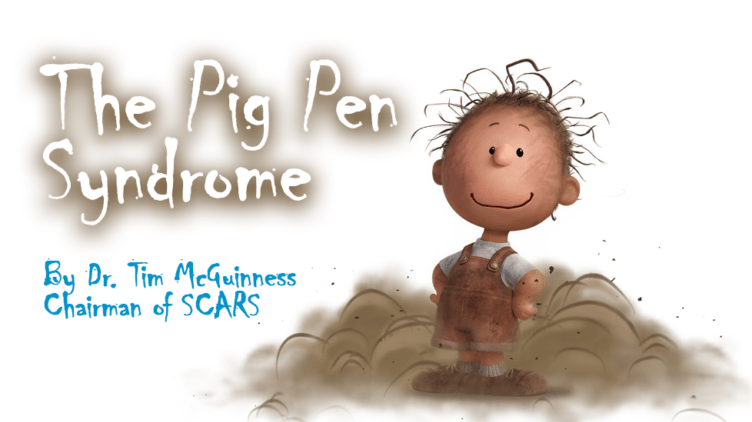Hope & The “Pig Pen” Syndrome – on ScamsNOW.com
A Different Take On The Happenstance Of Scams
By Tim McGuinness, Ph.D. – Anthropologist, Scientist, Director of the Society of Citizens Against Relationship Scams Inc. – Originally published on RomanceScamsNOW.com September 2018 – moved and updated 2023
Was It All About Hope? For Many Scam Victims, Was Just Bad Luck That They Were Scammed?
“Shit Happens” Is The Old Saying! Sometimes it happens a lot and doesn’t stop. Is it bad luck? Did you ever think you might be making impulsive decisions? That clinging to false hope might have been one of the many root causes for what happened.
Some people believe in the Karmic Wheel, but while that may influence luck on a long-term scale, it probably is not the cause of becoming involved in a relationship scam. But hope – especially false hope, might be a real contributor.

The Cause Is What We Call The “Pig Pen Syndrome.”
“Pig-Pen” is a secondary character in the Peanuts comic strip © by Charles M. Schulz. He is best known as the little boy with a cloud of dirt that constantly follows him.
Do you always have a dark cloud over your head? At least since you were scammed?
Some scam survivors stay trapped in their victimhood and continue to make decisions impulsively, rather than taking the time to learn how to slow down and let the logical part of their mind make the decisions,
It Is All Psychological!
When something bad happens, people tend to shut down. After their first scam ends they may be in shock or desperation and fear. Either way, these are not mindsets that help to avoid additional risks and new scams.
Newer victims are poorly equipped to avoid risks, they stop taking precautions and also stop their own positive mentality. This, in turn, tends to invite more problems due to the lack of avoidance, the lack of concern, and the lack of care.
Decisions become much more emotional. Small events cause larger emotional reactions that ripple through their life, creating other larger waves, that create others and so on. Of course, the triggers come from the trauma that the victim experienced, but without support and care, they can escalate.
Each event is not dampened, but rather amplified, because the victim’s emotional state doesn’t see it as the isolated thing it is – a trigger – instead, it is all part of the “universe hates you.”
Events feel like they carry on from one into another, instead of just being momentary problems to be solved and forgotten.
Eventually, the victim’s own emotional exhaustion tends to drain the possible reactions from their life, and it can begin to separate them again, creating the opportunity for HOPE – false hope.
But HOPE is very infectious. It breeds. It is also intoxicating if scam victims let it be. That is a part of the vulnerabilities that caused the opportunity for the scam originally.
Hope is like the glass of wine people have at dinner – just one glass and they are feeling fine. Two glasses become three and four, and then they fall and break the glass and cut themself.
Some people abuse hope and live in fantasies – we call that denial, using it like a drug. Most take one glass (ok, sometimes two) but know their limit. Some never learn this or forget this while in control of the drug – meaning false hope or denial.
Once they have overdosed on hope and had terrible things happen as a result, they need to learn and understand the power of this false unrealistic hope and the magical thinking that accompanies it.
Every scam victim needs to recover from their scam. and learn the reasons why the scam happened. Learn about the many contributing factors that created their vulnerabilities that were so expertly exploited by the criminals. In other words, how to break the cycle of bad luck and the dark cloud that hangs over their head.
Recovery is about learning and adjusting their worldview, and with it getting rid of false hopes and beliefs or they will again be the “Pig Pen” out on the street living a life of misery, with that dark cloud hanging over their head.
Hope
Hope is one of those curious miracle drugs. It can help anyone find the strength they need to make it through the worst of times, but hope can also turn dark when it becomes a fantasy or becomes denial that holds back reality. And it easily leads to places where evil lives.
The answer is to be realistic in your hope. Enjoy hope with wide eyes instead of blinders! See the positives that can come from recovering after a scam happens, rather than living in and continuing to despair, holding on to false hope, and denial.
Be hopeful and not hopeless, just do not let hope control your life as it did before and during the scam!
Confirmed original by plagiarismdetector.net
SCARS Resources:
- For New Victims of Relationship Scams newvictim.AgainstScams.org
- Subscribe to SCARS Newsletter newsletter.againstscams.org
- Sign up for SCARS professional support & recovery groups, visit support.AgainstScams.org
- Find competent trauma counselors or therapists, visit counseling.AgainstScams.org
- Become a SCARS Member and get free counseling benefits, visit membership.AgainstScams.org
- Report each and every crime, learn how to at reporting.AgainstScams.org
- Learn more about Scams & Scammers at RomanceScamsNOW.com and ScamsNOW.com
- Global Cyber Alliance ACT Cybersecurity Tool Website: Actionable Cybersecurity Tools (ACT) (globalcyberalliance.org)
- Self-Help Books for Scam Victims are at shop.AgainstScams.org
- Donate to SCARS and help us help others at donate.AgainstScams.org
- Worldwide Crisis Hotlines: International Suicide Hotlines – OpenCounseling : OpenCounseling
- Campaign To End Scam Victim Blaming – 2024 (scamsnow.com)
More:
- What Really Are Vulnerabilities That Lead To Scams? (scamsnow.com)
- Magical Thinking – How Biased & Delusional Thinking Enslaves Scam Victims (scamsnow.com)
- Scam Victims And The Reactivity Loop (scamsnow.com)
- Projection And Scam Victims (scamsnow.com)
- The Psychology of Scams (romancescamsnow.com)
- Recovering From Scams (romancescamsnow.com)
- “Pig-Pen” | Peanuts Wiki | Fandom
-/ 30 /-
What do you think about this?
Please share your thoughts in a comment below!
More ScamsNOW.com Articles
-/ 30 /-
What do you think about this?
Please share your thoughts in a comment above!
SCARS LINKS: AgainstScams.org RomanceScamsNOW.com ContraEstafas.org ScammerPhotos.com Anyscam.com ScamsNOW.com
reporting.AgainstScams.org support.AgainstScams.org membership.AgainstScams.org donate.AgainstScams.org shop.AgainstScams.org
youtube.AgainstScams.org linkedin.AgainstScams.org facebook.AgainstScams.org
ARTICLE RATING
TABLE OF CONTENTS
- A Different Take On The Happenstance Of Scams
- Was It All About Hope? For Many Scam Victims, Was Just Bad Luck That They Were Scammed?
- The Cause Is What We Call The “Pig Pen Syndrome.”
- It Is All Psychological!
- Hope
- SCARS Resources:
- More:
- SCARS Institute™ ScamsNOW Magazine
Society of Citizens Against Relationship Scams Inc. [SCARS]
CATEGORIES
MOST POPULAR COMMENTED ARTICLES
POPULAR ARTICLES
U.S. & Canada Suicide Lifeline 988
![NavyLogo@4x-81[1]](https://scamsnow.com/wp-content/uploads/2025/04/NavyLogo@4x-811.png)
ARTICLE META
WHAT PEOPLE ARE TALKING ABOUT LATEST SITE COMMENTS
See Comments for this Article at the Bottom of the Page
on Substance Abuse Susceptibility And Scam Victims – 2024: “It is understandable how some would feel that alcohol or substance abuse would be helpful in handling their feelings after…” Jul 1, 20:36
on Scam Victims Use Work To Avoid Healing: “The last 6 years have been the most difficult of my life. The pandemic, having both parents in the hospital…” Jun 29, 18:38
on Entitlement Mentality And How Scam Victims Often Lose Their Path To Recovery – 2024: “Thank you for this discussion of entitlement. I can see from the descriptions listed that I have not felt entitlement.…” Jun 29, 18:22
on Samurai Wisdom and Rituals for Clearing the Mind After Scam Trauma – 2025 – [VIDEOS]: “A great guide on how to move forward in our recovery process with a calm mind, cleansed on an ongoing…” Jun 28, 07:34
on Delayed Gratification and Patience in Scam Victim Recovery – 2025 – [VIDEOS]: “We want to recover quickly and… we make new mistakes. How not to speed up the recovery process, how to…” Jun 28, 06:41
on The Unique Injury Of Betrayal Trauma On Scam Victims – 2024: “Primarily because you did not see it coming” Jun 27, 23:57
on Changes In A Scam Victim’s Life: “I really detest the way my trust in others has been affected by the scamming I went through. I used…” Jun 27, 14:47
on The Unique Injury Of Betrayal Trauma On Scam Victims – 2024: “Betrayal Trauma is the worst feeling ever. Why does it seem so much worse when a scammer does that to…” Jun 27, 14:34
on EMDR Therapy For Scam Victims’ Trauma – A Part Of The Recovery Process For Many – 2024: “Very comprehensive article explaining all aspects of EMDR. I’d only heard of it before and now I have a much…” Jun 26, 19:01
on Forgiving Yourself After Surviving a Romance or Investment Scam – 2025: “Thank you for this valuable article. Self-forgiveness was for me the biggest step that led to my recovery. That also…” Jun 26, 17:28
on Counseling And Your Native Language: “These points make perfect sense. I can’t imagine trying to express complex emotions in a second language. I realize many…” Jun 26, 16:05
on Thought-Terminating Cliches – How What You and Others Say Stops Critical Thinking and Recovery for Scam Victims – 2025: “I didn’t realize that these “innocent phrases” clichés ending thoughts, can have such effect / negative -inhibiting / on our…” Jun 26, 14:48
on Scam Victim Resistance In Support Groups Therapy Or Counseling Can Destroy Opportunities For Recovery – 2024: “Working with either a support group or therapist to me means a self commitment to actively participating in the therapy.…” Jun 24, 21:01
on ‘I Just Want To Forget It’ – Denial & Avoidance Are Natural But Will Not Help Scam Victims On Their Path To Recovery From Scams – 2024: “My financial loss, the shock and betrayal of the crime ending all combined to fray my nerves and spend hours…” Jun 24, 20:10
on You Hate Being Told What To Do? How Your Rebellious Mentality Can Sabotage Your Recovery – 2025: “I am a bit of a rebel, and the moment someone tells me to do something, worse, does it even…” Jun 24, 15:04
on You Hate Being Told What To Do? How Your Rebellious Mentality Can Sabotage Your Recovery – 2025: “You are very welcome” Jun 24, 03:01
on You Hate Being Told What To Do? How Your Rebellious Mentality Can Sabotage Your Recovery – 2025: “This is a great article, which makes perfect sense as to why anyone would resist the help offered to them.…” Jun 23, 20:01
on Scam Victims’ Responsibilities – 2021 [Updated 2025]: “Thank you for this article. As I continue my journey, I focus on the here and now and let the…” Jun 21, 16:26
on Scam Victims Avoid Or Escape The Aftermath Of Scams – How Denial And Distraction Avoid Confronting Reality – 2024: “In the earliest days after my crime I felt powerless, helpless and weak. I had been through so much in…” Jun 21, 14:46
Important Information for New Scam Victims
Please visit www.ScamVictimsSupport.org – a SCARS Website for New Scam Victims & Sextortion Victims
SCARS Institute now offers a free recovery program at www.SCARSeducation.org
Please visit www.ScamPsychology.org – to more fully understand the psychological concepts involved in scams and scam victim recovery
If you are looking for local trauma counselors, please visit counseling.AgainstScams.org
If you need to speak with someone now, you can dial 988 or find phone numbers for crisis hotlines all around the world here: www.opencounseling.com/suicide-hotlines
Statement About Victim Blaming
Some of our articles discuss various aspects of victims. This is both about better understanding victims (the science of victimology) and their behaviors and psychology. This helps us to educate victims/survivors about why these crimes happened and not to blame themselves, better develop recovery programs, and help victims avoid scams in the future. At times, this may sound like blaming the victim, but it does not blame scam victims; we are simply explaining the hows and whys of the experience victims have.
These articles, about the Psychology of Scams or Victim Psychology – meaning that all humans have psychological or cognitive characteristics in common that can either be exploited or work against us – help us all to understand the unique challenges victims face before, during, and after scams, fraud, or cybercrimes. These sometimes talk about some of the vulnerabilities the scammers exploit. Victims rarely have control of them or are even aware of them, until something like a scam happens, and then they can learn how their mind works and how to overcome these mechanisms.
Articles like these help victims and others understand these processes and how to help prevent them from being exploited again or to help them recover more easily by understanding their post-scam behaviors. Learn more about the Psychology of Scams at www.ScamPsychology.org
SCARS INSTITUTE RESOURCES:
If You Have Been Victimized By A Scam Or Cybercrime
♦ If you are a victim of scams, go to www.ScamVictimsSupport.org for real knowledge and help
♦ Enroll in SCARS Scam Survivor’s School now at www.SCARSeducation.org
♦ To report criminals, visit https://reporting.AgainstScams.org – we will NEVER give your data to money recovery companies like some do!
♦ Follow us and find our podcasts, webinars, and helpful videos on YouTube: https://www.youtube.com/@RomancescamsNowcom
♦ Learn about the Psychology of Scams at www.ScamPsychology.org
♦ Dig deeper into the reality of scams, fraud, and cybercrime at www.ScamsNOW.com and www.RomanceScamsNOW.com
♦ Scam Survivor’s Stories: www.ScamSurvivorStories.org
♦ For Scam Victim Advocates visit www.ScamVictimsAdvocates.org
♦ See more scammer photos on www.ScammerPhotos.com
You can also find the SCARS Institute on Facebook, Instagram, X, LinkedIn, and TruthSocial
Psychology Disclaimer:
All articles about psychology and the human brain on this website are for information & education only
The information provided in this and other SCARS articles are intended for educational and self-help purposes only and should not be construed as a substitute for professional therapy or counseling.
Note about Mindfulness: Mindfulness practices have the potential to create psychological distress for some individuals. Please consult a mental health professional or experienced meditation instructor for guidance should you encounter difficulties.
While any self-help techniques outlined herein may be beneficial for scam victims seeking to recover from their experience and move towards recovery, it is important to consult with a qualified mental health professional before initiating any course of action. Each individual’s experience and needs are unique, and what works for one person may not be suitable for another.
Additionally, any approach may not be appropriate for individuals with certain pre-existing mental health conditions or trauma histories. It is advisable to seek guidance from a licensed therapist or counselor who can provide personalized support, guidance, and treatment tailored to your specific needs.
If you are experiencing significant distress or emotional difficulties related to a scam or other traumatic event, please consult your doctor or mental health provider for appropriate care and support.
Also read our SCARS Institute Statement about Professional Care for Scam Victims – click here
If you are in crisis, feeling desperate, or in despair, please call 988 or your local crisis hotline.
More ScamsNOW.com Articles
A Question of Trust
At the SCARS Institute, we invite you to do your own research on the topics we speak about and publish. Our team investigates the subject being discussed, especially when it comes to understanding the scam victims-survivors’ experience. You can do Google searches, but in many cases, you will have to wade through scientific papers and studies. However, remember that biases and perspectives matter and influence the outcome. Regardless, we encourage you to explore these topics as thoroughly as you can for your own awareness.















![scars-institute[1]](https://scamsnow.com/wp-content/uploads/2025/04/scars-institute1.png)
![niprc1.png1_-150×1501-1[1]](https://scamsnow.com/wp-content/uploads/2025/04/niprc1.png1_-150x1501-11.webp)

Continuous pity parties will get you nowhere. But I am hoping to have plenty of recovery celebrations.